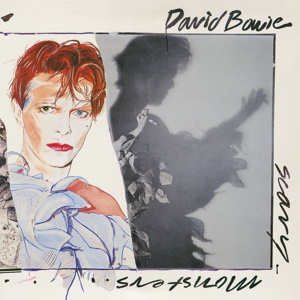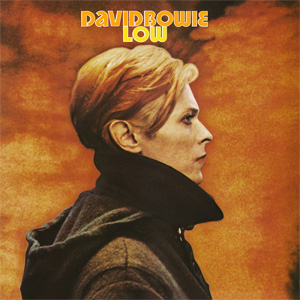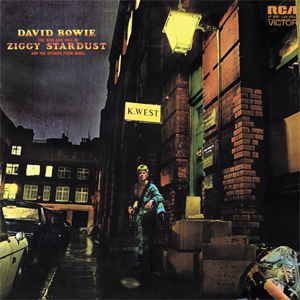Tuesday, 12 January 2016
Welcome to 2016. The Ephemeric is sorry to be starting this new year not with the traditional Hot List, but with the very sad news that has just broken this morning.

On the 10th of January, 2016, just two days after he turned 69 and released what will ultimately be his final album, Blackstar, David Bowie has passed away as a result of cancer. The world is in shock, particularly as his illness had not previously been disclosed to anyone outside of immediate family, but as details come in it is becoming clear that Bowie was diagnosed some 18 months ago, and that it was clear for some time that he would not be able to delay the inevitable for much longer.
Bowie will be remembered as one of history's greatest artists, not just for his music, which has spanned 6 decades, but for his accomplished career as an actor, writer, producer, and his unique influence on pop-culture all over the world. Bowie has released 27 albums, 9 of which have reached number 1 on the charts, soon to be 10 going by early sales reports of Blackstar. Hit single Let's Dance is one of the greatest selling songs of all time. Bowie has written chart topping hits for a host prominent artists including Arcade Fire, The Arctic Monkeys, Lou Reed, Iggy Pop, Mott the Hoople, and Queen, and collaborated with the likes of John Lennon, Brian Eno, Mick Jagger, and Tina Turner. He has been covered by the likes of Nirvana and Dario G, and been remixed by countless others.
He is a household name all over the world, from Europe to USA, to Japan, and even reaching into outer space. Following his death, shrines have appeared as far apart as hometown Brixton, Berlin where he famously recorded his Berlin trilogy with Brian Eno, and Russia where he was one of the top selling western artists during the Cold War era. It is no overstatement to say that he has influenced just about every contemporary musician in some way, but more than that today's outpouring of love from politicians, business leaders, scientists and artists illustrates the inspiration he has given us all over the decades.
And yet these facts only scratch the surface of the true extent of his legacy in pop culture history. No doubt there will be more coherent and comprehensive tributes written than anything I could hope to deliver in this heat of the moment stream of consciousness, but earlier today no less transformative a figure than Madonna described David Bowie in one word: "gamechanger".
Arriving at a time when popular music was much more about conformity, identifying with peers, and belonging, Bowie gave people something they had never seen before. He brought trail-blazing spectacle at a time when other pop bands all had short haircuts and tidy matching suits, adopting a series of outlandish personae and wildly varying musical styles, from the glam alien rock star Ziggy Stardust, to the Weimar-era lounge-crooning of Aryan aristocrat The Thin White Duke, or the sinister Pierrot of Bowie's 1980s new romance phase.
No one had ever seen such theatricality from a musician, a thematic combination of music and narrative to create conceptual albums that were almost a new genre to themselves. Bowie's ability to continually reinvent his image and experiment in all genres of music displays an artistic depth that few have ever matched, and earned him the nickname of the "rock and roll chameleon".
But though the style changed, the message did not. For Bowie it wasn't just the the high quality of the music, so much as the formidably intellectual thoughts they contained. Dense and complex lyrics with allusions to politics, philosophy and society. Through his bizarre alien appearance, his androgyny and ambiguous sexuality, his flamboyance, and distinct sense of "otherness", Bowie appealed to the pariahs and the misfits of society. Bowie's famously homoerotic top of the pops appearance may seem like nothing today, but it shocked audiences at the time.
Rather than harness the contemporary ideal of "cool", these were songs which embraced being different, which told young people all over the world that it was ok to be gay, ethnically diverse, or otherwise unaccepted in society. Bowie became an idol to anyone who has ever felt alone or disaffected from the world.
This lies at the core of his enduring mystique, which by the end of his life had reached near mythical status. So it is fitting, for an artist every aspect of whose life appeared to consist some form of artistic expression, that his illness permitted him the foresight to even write his own curtain call. Indeed his final album Blackstar can now only be interpreted as a farewell to the world, a message intended to be heard posthumously with its thematic focus on death, time, and legacy. Millions of fans all over the world will be looking back at new single Lazarus, released in recent weeks, which would appear to take on a whole new meaning in this additional bit of context.
As an artist, Bowie never stopped innovating, never stopped experimenting, even after decades in music. For every new trend in music, Bowie was always at the forefront even in his final days. That one of the biggest stars music has ever known was able to maintain his ability to surprise for so many years is truly remarkable. But through all the myth and spectacle, we're reminded that Bowie was still just a human being, and one who will be sorely missed by a lot of people.
So first and foremost, thank you Major Tom for your contribution to the universe. For the rest of us, here are The Ephemeric's top 5 David Bowie albums, to help you get through this:
5. Aladdin Sane
 A spiritual successor to Bowie's defining album The Rise and Fall of Ziggy Stardust and the Spiders from Mars, conceptualised as "Ziggy goes to America", but the result more than stands up on its own.
A spiritual successor to Bowie's defining album The Rise and Fall of Ziggy Stardust and the Spiders from Mars, conceptualised as "Ziggy goes to America", but the result more than stands up on its own.
First there is the iconic cover art, that Bowie lightning bolt that has become such a ubiquitous symbol of rock and roll and pop culture in general. In all honesty, more people recognise the lightning bolt than know from where it comes. Teenagers all over the world wear it on t-shirts to this day, unaware what it really means as a symbol of teenage drama and glamour.
The music is most notable for it's avant-garde jazz influences, dominated by the astonishing piano work of Mike Garson, much of which was ad-libbed in the studio. Ultimately Aladdin Sane serves as a great summary of the disparate stylings of Bowie, from Brechtian odyssey Time to rock and roll classic The Jean Genie, and jazz piano masterpiece Aladdin Sane.
4. Scary Monsters (And Super Creeps)
 For some, the epitome of Bowie at his strangest, most extravagant self. Scary Monsters formed part of Bowie's transition from 1970s glam rock provocateur to 1980s worldwide superstar.
For some, the epitome of Bowie at his strangest, most extravagant self. Scary Monsters formed part of Bowie's transition from 1970s glam rock provocateur to 1980s worldwide superstar.
Here Bowie embraced, and indeed became the face of a whole new musical movement in the new romantic period of the 1980s, contrasting strongly with his rock and roll roots, and utterly confounding all those who had followed his career so far. This radical reinvention would become a characteristic feature of Bowie's evolution through the years.
Scary Monsters would see the debut of Bowie's creepy Pierrot character, his first since 1976's Thin White Duke, and with it an equally creepy lead single, Ashes to Ashes, most well known for its utterly groundbreaking music video, which still stands as one of the all time greatest. Follow up single Fashion would go on to become one of Bowie's most definitive tracks.
3. Low
 Under appreciated and perhaps not as well known as some of Bowie's other work; Low was the first album of the so-called "Berlin Trilogy", marking a turning point in Bowie's life which saw him relocate to Germany in the hopes of cleaning up his various addictions and reinvent himself from a creative perspective. Low also marks his first collaboration with Brian Eno.
Under appreciated and perhaps not as well known as some of Bowie's other work; Low was the first album of the so-called "Berlin Trilogy", marking a turning point in Bowie's life which saw him relocate to Germany in the hopes of cleaning up his various addictions and reinvent himself from a creative perspective. Low also marks his first collaboration with Brian Eno.
Aficionados will tell you that Low remains one of Bowie's most influential works, the one of the first of his albums to truly break away from the Ziggy/Aladdin Sane rock and roll mould that made him a star.
Characterised by instrumental and heavily synthesised tracks, most notably Sound and Vision, the album stands as one of Bowie's most adventurous, and truly wouldn't sound at all out of place were it released today. Bowie was decades ahead of his time here, and the shift in critical opinion between 1976 and today serves as a great case study.
2. The Rise and Fall of Ziggy Stardust and the Spiders from Mars
 Very difficult to choose between the top 2. Most people would describe Ziggy Stardust as not only the pivotal David Bowie album, but also one of the most influential concept albums of all time.
Very difficult to choose between the top 2. Most people would describe Ziggy Stardust as not only the pivotal David Bowie album, but also one of the most influential concept albums of all time.
Ziggy is the embodiment of the David Bowie story; an otherworldly rockstar as described in the song Ziggy Stardust, whose sheer celebrity and charisma forms a powerful following, and whose life ultimately derails into self-indulgence, egotism, and self-destruction, a Rock and Roll Suicide. Ziggy is the best cautionary tale ever written on the cult of celebrity, and thankfully one which Bowie himself heeded in time.
An album of such high concept had never been attempted before, and rarely accomplished so successfully even in the years hence. Ziggy also offers a very fine collection of individual songs, from Starman to Suffragette City.
1. Hunky Dory
 Hunky Dory may not have the heavyweight concept of Ziggy Stardust, but it is without a doubt, one of the finest collections of songs ever written.
Hunky Dory may not have the heavyweight concept of Ziggy Stardust, but it is without a doubt, one of the finest collections of songs ever written.
Releasing before Ziggy, it was this album that first brought Bowie to prominence, the album that made him an up and coming star and a household name.
The track list is just one classic after another. Changes, Oh! You Pretty Things, Life on Mars, and Queen Bitch. These all rank among the finest pop songs ever written, and even in these early days it's the sophistication in the writing that shines through the sublime melodies. Hunky Dory is the pivotal David Bowie album, shaping what was to come, first hinting at his potential as a formidable wordsmith as well as a musical shapeshifter.



